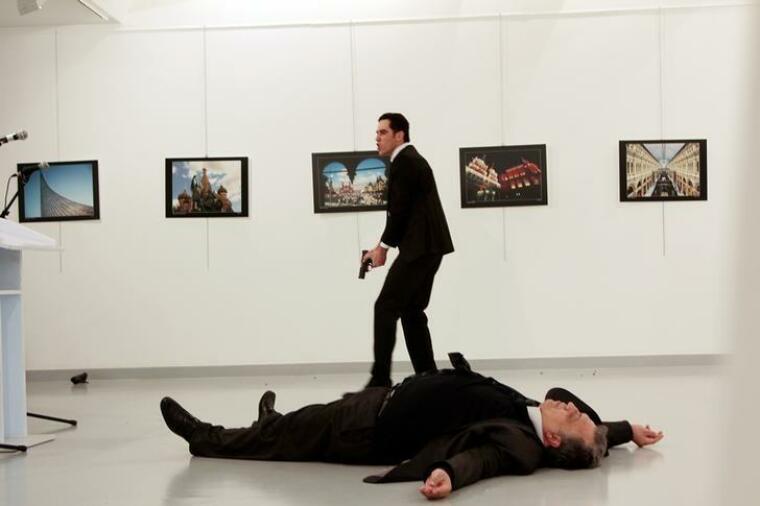ISIS releases list of Russian embassies in bid to incite more attacks

The Islamic State has released a document containing addresses and contact information of Russian embassies in a bid to provoke more attacks against officials.
The Russian embassies listed in the document include the offices in Kampala, Uganda; Tehran, Iran; Baku, Azerbaijan and Tirana, Albania. Apart from listing the locations of the embassies, the terrorist group also called on its supporters to carry out more attacks.
The list came after the assassination of Andrei Karlov, the Russian ambassador to Turkey, while he was delivering a speech at an art gallery in Ankara on Monday.
Russian President Vladimir Putin ordered an increase in his security detail at home and abroad following the attack, The Sun reported.
"I ask the special services to take additional measures to ensure security inside Russia and outside, to raise the security of Russian institutions and employees abroad," said Putin as reported by The Sun.
"And I ask you through channels of partnership to strengthen your work with the intelligence agencies of other states," he added.
Putin also asked his top diplomat and spy chiefs to consider boosting the security for Russian diplomats around the world. The Kremlin has sent investigators to Turkey to look into Karlov's murder.
The gunman was identified as Mevlut Mert Altintas, a 22-year-old policeman. He reportedly shouted, "Don't forget Aleppo" and "Allahu Akbar" — Arabic for "God is greatest" — as he shot the ambassador. Eleven more people were arrested in relation to the killing.
Mail Online reported that the pro-government media in Turkey has linked Altintas to the Fethullah Gulen movement, the group that is accused of instigating the failed coup in July.
Altintas was also apparently a part of the presidential bodyguard in the weeks following the failed coup.
Fethullah Gulen, the exiled Turkish cleric blamed for orchestrating the coup, has denounced the assassination as a "terrorist act" and said that he was "shocked and deeply saddened" by the tragedy.
Putin said that Karlov's murder is a "provocation aimed at undermining the improvement and normalisation of Russian-Turkish relations as well as undermining the peace process in Syria promoted by Russia, Turkey, Iran and other countries interested in solving this conflict in Syria."
 Christians don't have to affirm transgenderism, but they can’t express that view at work: tribunal
Christians don't have to affirm transgenderism, but they can’t express that view at work: tribunal Archaeology discovery: Medieval Christian prayer beads found on Holy Island
Archaeology discovery: Medieval Christian prayer beads found on Holy Island Presbyterian Church in America votes to leave National Association of Evangelicals
Presbyterian Church in America votes to leave National Association of Evangelicals Over 50 killed in 'vile and satanic' attack at Nigerian church on Pentecost Sunday
Over 50 killed in 'vile and satanic' attack at Nigerian church on Pentecost Sunday Ukrainian Orthodox Church severs ties with Moscow over Patriarch Kirill's support for Putin's war
Ukrainian Orthodox Church severs ties with Moscow over Patriarch Kirill's support for Putin's war Islamic State kills 20 Nigerian Christians as revenge for US airstrike
Islamic State kills 20 Nigerian Christians as revenge for US airstrike Man who served 33 years in prison for murder leads inmates to Christ
Man who served 33 years in prison for murder leads inmates to Christ


 Nigerian student beaten to death, body burned over ‘blasphemous’ WhatsApp message
Nigerian student beaten to death, body burned over ‘blasphemous’ WhatsApp message 'A new low': World reacts after Hong Kong arrests 90-year-old Cardinal Joseph Zen
'A new low': World reacts after Hong Kong arrests 90-year-old Cardinal Joseph Zen Iran sentences Christian man to 10 years in prison for hosting house church worship gathering
Iran sentences Christian man to 10 years in prison for hosting house church worship gathering French Guyana: Pastor shot dead, church set on fire after meeting delegation of Evangelicals
French Guyana: Pastor shot dead, church set on fire after meeting delegation of Evangelicals ‘Talking Jesus’ report finds only 6% of UK adults identify as practicing Christians
‘Talking Jesus’ report finds only 6% of UK adults identify as practicing Christians Mission Eurasia ministry center blown up in Ukraine, hundreds of Bibles destroyed: 'God will provide'
Mission Eurasia ministry center blown up in Ukraine, hundreds of Bibles destroyed: 'God will provide' Church holds service for first time after ISIS desecrated it 8 years ago
Church holds service for first time after ISIS desecrated it 8 years ago Burger King apologizes for 'offensive campaign' using Jesus' words at the Last Supper
Burger King apologizes for 'offensive campaign' using Jesus' words at the Last Supper Uganda: Muslims abduct teacher, burn him inside mosque for praying in Christ’s name
Uganda: Muslims abduct teacher, burn him inside mosque for praying in Christ’s name